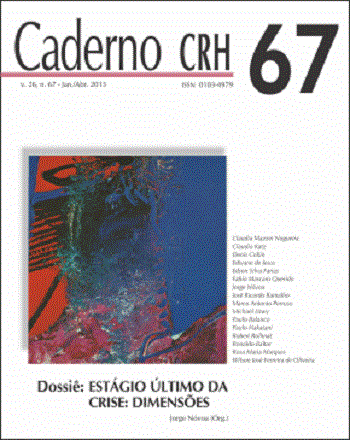MANIFESTACIONES DE LA CRISE EN AMERICA LATINA Y LAS PARADOJAS DEL NEODESARROLISMO ARGENTINO
DOI:
https://doi.org/10.9771/ccrh.v26i67.19489Keywords:
Crisis, Neoliberalismos transnacionales, Neo desarrollismo, América Latina, ArgentinaAbstract
El agravamiento de la crisis global acentúa las limitaciones de la economía latinoamericana para atemperar la turbulencia. Aumenta la centralidad de UNASUR, pero el fondo de estabilización no contrarresta la extranjerización de las finanzas y el estancamiento del Banco del Sur. Las enormes reservas terminarán socorriendo a los banqueros europeos, si no hay avances en la moneda común. El extractivismo exportador impide repetir el desarrollo manufacturero asiático y refuerza la preeminencia de las empresas transnacionales. Los planes asistenciales no reducen la desigualdad, ni atemperan la superexplotación, mientras la lumpen-burguesía del narcotráfico potencia la marginalidad social. El desprestigio neoliberal ha resucitado los enfoques neo-desarrollistas, pero la sustitución de las viejas burguesías nacionales por grupos exportadores obstruye los proyectos de reindustrialización. En este contexto si plantea la posibilidad de una tercera vía verdaderamente popular.
PALABRAS-CLAVE: Crisis. Neoliberalismos transnacionales. Neo desarrollismo. América Latina, Argentina.
MANIFESTATIONS OF THE CRISIS IN LATIN AMERICA AND THE PARADOXES OF ARGENTINE NEO-DEVELOPMENT
Claudio Katz
The worsening global crisis has made it clear that the Latin American economy’s power to contain turbulence is limited. UNASUL’s central role has increased, but the stabilization fund has not been able to prevent the foreign influence on the finances and stagnation of the Banco do Sul. Its enormous currency reserves will end up bailing out European banks if their common currency’s luck does not improve. The practice of extracting natural resources for export keeps the economy from following the Asian countries’ example of developing manufacturing and also reinforces the predominance of transnational companies. Social welfare programs do not reduce inequality, nor do they change super-exploitation, while the narcotraffic lumpen proletariat increases the potential for social marginalization. Neo-liberal prestige has revived neo-developmentalist focuses, but the substitution of the old Argentine bourgeoisie by export groups has hindered projects for re-industrialization. Within this context, a third alternative truly representative of the people is being delineated.
KEY WORDS: Crisis. Transnational neoliberalism. Neodevelopmentalism. Latin America. Argentina.
MANIFESTATIONS DE LA CRISE EN AMÉRIQUE LATINE ET LES PARADOXES DU NÉODÉVELOPPEMENT ARGENTIN
Claudio Katz
L’aggravation de la crise mondiale accentue les limitations de l’économie latino-américaine pour en modérer la turbulence. La centralité de l‘UNASUL augmente, mais le fond de stabilisation ne diminue pas l’étrangéisation des finances et la stagnation de la Banque du Sud. Les réserves, énormes, finiront par porter secours aux banquiers européens si les chances d’une monnaie unique n’aboutissent pas. L’extractivisme exportateur empêche de reproduire le développement des manufactures asiatiques et renforce la prédominance de sociétés transnationales. Les plans d’assistanat ne réduisent pas les inégalités ni ne modèrent la super-exploitation alors que la lumpen-bourgeoisie du narcotrafic potentialise la marginalité sociale. Le manque de prestige néolibéral a ressuscité les propositions basées sur le néo-développement, mais le remplacement des vieilles bourgeoisies nationales par des groupes exportateurs rendent difficiles les projets de réindustrialisation. Dans ce contexte, une nouvelle trajectoire se dessine, celle d’une troisième voie
réellement populaire.
MOTS-CLÉS: Crise. Néolibéralisme transnational. Néo-développement. Amérique Latine, Argentine.
Publicação Online do Caderno CRH no Scielo: http://www.scielo.br/ccrh
Publicação Online do Caderno CRH: http://www.cadernocrh.ufba.br
Downloads
Downloads
Published
How to Cite
Issue
Section
License
Todo o conteúdo da revista, exceto onde indicado de outra forma, é licenciado sob uma atribuição do tipo Creative Commons BY.
O periódico Caderno CRH on-line é aberto e gratuito.





